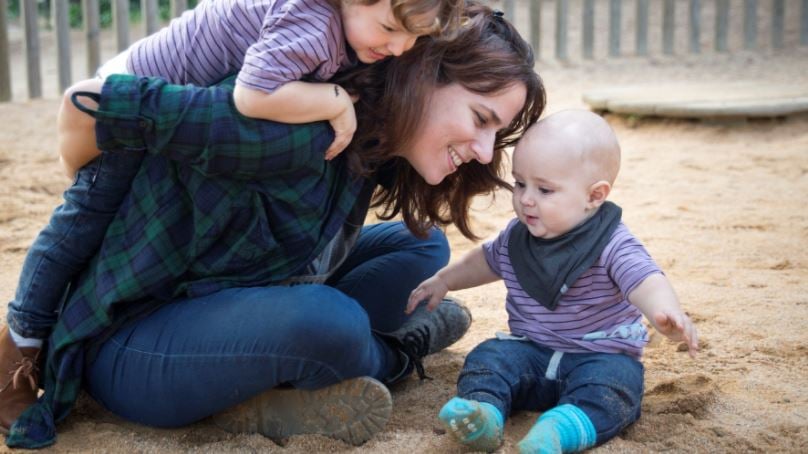There is a great Steve Biddulph quote that says, "It is our job as parents to be less anxious than our children."
It's normal to worry. The worry starts from the time your child is a tiny baby. Are they eating enough? Are they sleeping as they should? Are they hitting their milestones as they should be?
Then you start to worry about different things. About bigger things. What if you choose the wrong preschool for your child and they're not happy? What if your parenting style is doing more harm than good?
Any seasoned parent will tell you that the worry never stops. Even when your babies grow into adults with babies of their own. But when that worry starts to become relentless and all-consuming or starts to really impact daily activities, it's a problem.
If your parental anxiety is left unchecked, it can affect your parenting ability as well as your relationship with your child. If you're feeling like parenting anxiety is becoming a problem for you, it's undoubtedly welcome news that there are proven strategies that can help you to manage your worry and anxious behaviours.

Signs of Parental Anxiety and Parenting Stress
How do you know if your worry has turned into anxiety? These are some common behaviours that anxious parents might display:
Shielding Behaviour
If your parental anxiety manifests itself in shielding behaviour, you effectively try to guard your child against any possible danger or harm, real or perceived.
For example, if your child runs on the footpath, there is a chance they may fall and graze their knee. You shield them from this potential harm by telling them to walk carefully. You might also tell your child's preschool educators that you don't want them engaging in possibly "risky" behaviour.
Healthy risk-taking is an important part of child development. By shielding your child from all possible risks they can't engage in healthy opportunities to discover their own capabilities and boundaries.
Avoidance Behaviour
Avoidance behaviour is exactly what it sounds like. If you're afraid of losing your child in a crowd, you'll avoid crowds. If you're afraid of your child being bitten by a dog, you'll avoid dogs. You fear of choosing the right early education centre for your child might lead you to the decision that you won't put them in care at all. Whatever you perceive as a threat to you or your child, you'll avoid it.
Avoidance may remove the immediate threat you perceive but it doesn't change the fear. Crowds or dogs or whatever you fear will still be fearful to you.
Children can also pick up on this avoidance and continue to perpetuate the same behaviours.
Anxious talk
It helps to talk about your worries with other parents, friends or your child's teachers or educators. Sharing and talking about your fears can go some way to helping you process them and get a new perspective.
However, anxious talk with your children, or even within earshot of your children, can be harmful. They can internalise anxious thinking and, in turn, exacerbate their own fears or worries.
Becoming consumed by your child's issues
It's normal to be worried when your child is going through something. Whether it's playground drama, trouble with schoolwork or something else altogether, of course, you don't want to see your child suffering.
But if your child's problems are consuming your thoughts, that could be a sign of parental anxiety.
If that is happening and you are obsessing over your child's problems, for your child it may feel like there is no escape from their troubles. You are their safe place. They need to be able to turn to their parents to talk about what is worrying them. But they need to be able to talk about other things too.

Causes of Parental Anxiety
What is behind the parental anxiety you're experiencing? Is it just a sign of the times? Has the world become more dangerous with more things for us to fear?
Modern life may play a role in intensifying the anxiety disorders that parents suffer from. Any parent who has Googled a symptom or turned to the internet with any type of worry or concern will agree with that. There is so much information out there and it's hard to know what to believe.
But there are also other risk factors that may play a role. These may include your own personal or family history of mental illness or a stressful or traumatic event that may trigger the anxiety. They say that comparison is the thief of joy. Well, over comparison, where you excessively compare your child to their peers can also contribute to parental anxiety.
You might be able to pinpoint the source of your own anxiety, or maybe you can't. Either way, if it's becoming a problem, it's best to seek professional help.

Effects of Anxious Parents on Children
It would be nice to think that as parents we can worry all we like and it won't have any impact on our children. The truth is, we influence their lives in ways that we probably don't even realise ourselves.
Behaviours consistent with parental anxiety can manifest in ways that do impact children. Here are some of the common ones to be aware of:
Overprotection and Overcontrol
When you feel worried about something, it's natural to take steps to try and control the situation or to protect yourself from harm. Of course, you want the best for your child and to protect them. But when this behaviour becomes excessive, it can be damaging.
Overprotection is ultimately about stopping any risky behaviour. You might follow your child around to ensure they don't fall over and hurt themselves. Or want to speak to the director of the preschool if your child has a minor disagreement with one of their friends.
Overcontrol is something that typically happens with older children. You might make decisions on behalf of your child, such as the sports they play or the subjects they choose to study at school.
This behaviour comes from a good place. You want your child to be safe, healthy and happy. However, children need to experience autonomy and learn the consequence of making the wrong decision. They need to develop resilience and understand that they are responsible for the choices they make in life.
Modelling Anxious Behaviour
When your children see you behaving in an anxious manner over a prolonged period of time, they may start to take on your worries and internalise them. They see the triggers for your anxiety and also start to fear those same situations or triggers.
The thing to remember is that children are always watching and observing. They might not always listen to you or do what you ask. But they are like little sponges, soaking in everything you do and say and then interpreting that in the context of their own worldview.
Stress During Pregnancy and Hereditary Anxiety
There is also some evidence to suggest that if a mother is stressed during pregnancy, it may trigger changes in her baby's brain development. Research has also shown that when parents stress is heightened in the first few years of a child's life, it can trigger changes in the child's genes.
This research shows that parental anxiety and stress can have a hereditary component and also cause physiological changes in children.
How to Manage Your Anxiety as a Parent
The picture isn't all grim. Even if you are suffering from parenting anxiety, there are things you can do to manage your anxiety:
Get to Know Your Triggers
It's likely that your anxiety is triggered by certain things. Crowds. Dogs. Tall trees that are falling hazards. The slightest cough from your child. Identifying and understanding these triggers is a good first step.
Start to notice what is triggering your anxiety. Look for patterns and keep a record of how you feel and respond to different situations. This can help you to put boundaries in place and also get help to deal with the reason behind your anxiety triggers.
Meditation and Breathing
It may not be practical to engage in a 15-minute mindfulness meditation every time you start feeling anxious. But you can learn some mindfulness, breathing and relaxation techniques to help calm you in the moment.
When you feel that all familiar wave of anxiety washing over you, stop and take a deep breath. And then another one. And another.
Stop and count to ten.
Wriggle your fingers and your toes.
These are just examples - find something that works for you.
Separate Facts From Fears
This is about understanding if the fears you have are an actual problem that warrants your anxiety.
Start with examining your fear. What evidence or facts do you have that show there are real risks attached to the fear?
If you're worried about your child having issues with a friend, what is the actual issue? Is it just a minor tiff that will resolve itself naturally? Or is it ongoing and systemic and needs intervention?
If you're worried about your child not reaching their developmental milestones, have you spoken to a professional about your concerns? What about your child care educators? Do they share your concerns? Or is your child within the normal range of development?
If you're worried about choosing the right preschool because something might happen, have you been to the preschool to meet the educators? Do you have other friends or neighbours who you can ask about their experience with the centre? Have you checked if the centre is meeting the National Quality Standards?
When you look at facts and evidence, it can help to keep you calm.
Talk to Your Partner and Other Parents
A problem shared is a problem halved. If you have a partner or trusted friend or family member, it can help to talk about your worries. Obviously, not within earshot of your child.
What help is this? For starters, as you open up about your fears, they might also share their fears with you. It's good to know that it's normal to worry and common for all parents to do so at different times. Also, they can help you to see the fact from the fear. Or even play a support role for you as you try to manage your anxiety.
Seek Professional Help
There is also professional support and help available to you. Both for things that you might worry about for your children, such as developmental milestones, and also for your own anxiety.
If you are finding that your anxiety is interfering with your sleep or your ability to work or parent, reach out for help. Speak to your GP or get a referral to a mental health professional such as a counsellor or psychologist. These professionals are highly trained in anxiety disorders and can give you strategies to overcome your challenges.
Make a Plan
Sometimes your fears can seem bigger than they really are. You shield, you avoid and do whatever else you can to ensure they don't become a reality. But what if you direct that energy in a productive way towards making a plan.
If you're worried about your child injuring themself if they climb a tree, perhaps a soft mat underneath the tree might help to calm your fears. Or if you're concerned about choosing the right early education centre for your child, take advantage of opportunities to visit the centre and observe.
Simply knowing that you have a plan in place can help to allay your fears and minimise your anxiety.
Teach Your Child Healthy Ways to Cope With Anxiety
Through your own anxious thoughts and behaviours, you can even role model health coping strategies for your children
Remember, children are sponges. They see and understand more than we often give them credit for.
At one point or another, your child will come up against their own fears. They might be afraid of climbing to the top of a big slide or they might have social anxiety and be afraid of approaching other kids. You can teach them some of the strategies you know such as deep breathing and mindfulness or help them to break their worries down into fact versus fear.
Information and Support for Stressed Parents
Parenting is no walk in the park. It's full of ups and downs, highs and lows. We're thrown challenge after challenge and need to navigate our way through.
But remember, you're not alone. Whether you have an anxiety disorder or mental health concern, you can find support. Start with your own health professional who can provide medical advice and strategies.
You can also find further trustworthy health information on the Australian Government Department of Health website as well as the Beyond Blue website. If you have anxious children, Headspace is a good source of information and support.
Stress is normal. Worry is normal. Anxiety is not. If you're feeling like your worry has turned into something more, seek help. There is support available and it can help you to embrace your best parenting self.
At Gowrie NSW, we're always here to help. We understand that choosing the right preschool or early education centre for your child is a big deal. If you or your child are feeling anxious about the decision or starting on the first day, we can support you through the journey.
Our qualified and experienced educators care about the development of each and every child. You can trust that your child is in the best of hands, making new discoveries and learning new things everytime they step inside our door.










.jpg)